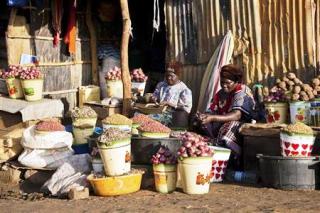S. Sudan: High food prices pushes inflation to 35%
February 7, 2012 (JUBA) – Inflation in South Sudan increased to 35% last month, compared to the 25% registered in December 2012, the country’s national bureau of statistics said in its latest release.

Landlocked South Sudan heavily relies on food imported from neighbouring countries, food prices reportedly increasing by 33.3% from January 2012 to January 2013, while the prices for alcoholic beverages and tobacco increased by 231.4% over the same period.
Inflation, data released by the statistical body shows, also soured in town likes Malakal (37.8%), Juba (23.7%) and Wau (4.7%), with the increase further attributed to high food prices.
“The increase in the price of food and non-alcoholic beverages was mainly caused by higher fruit prices, due to the reintroduction of seasonal products in the market,” the release from the statistical body reads in part.
South Sudan government, last year, initiated a series of austerity measures to cope up with the country’s worsening economic situation in the absence of oil revenues, which previously accounted for 98% of the country’s annual budget.
Sudan and South Sudan are yet to agree on several outstanding post-session issues, including oil, considered the economic lifeline of the two countries. South Sudan took with it almost 75% of the oil previously shared by the two countries, when it seceded from Sudan in July 2011.
(ST)
